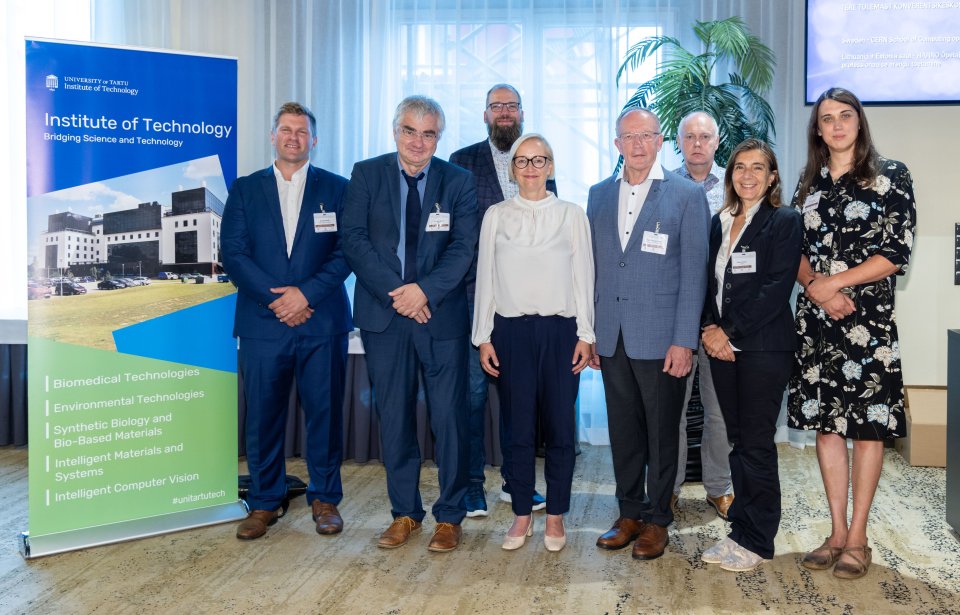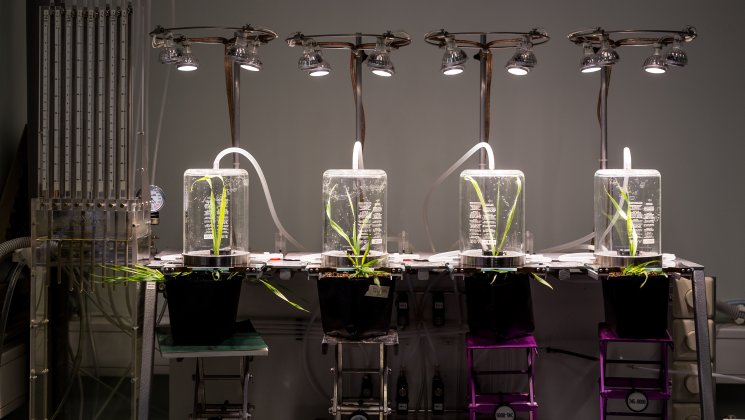-
Faculty of Arts and HumanitiesDean's Office, Faculty of Arts and HumanitiesJakobi 2, r 116-121 51005 Tartu linn, Tartu linn, Tartumaa EST0Institute of History and ArchaeologyJakobi 2 51005 Tartu linn, Tartu linn, Tartumaa EST0Institute of Estonian and General LinguisticsJakobi 2, IV korrus 51005 Tartu linn, Tartu linn, Tartumaa ESTInstitute of Philosophy and SemioticsJakobi 2, III korrus, ruumid 302-337 51005 Tartu linn, Tartu linn, Tartumaa EST0Institute of Cultural ResearchÜlikooli 16 51003 Tartu linn, Tartu linn, Tartumaa EST0Institute of Foreign Languages and CulturesLossi 3 51003 Tartu linn, Tartu linn, Tartumaa EST0School of Theology and Religious StudiesÜlikooli 18 50090 Tartu linn, Tartu linn, Tartumaa EST0Viljandi Culture AcademyPosti 1 71004 Viljandi linn, Viljandimaa EST0Professors emeritus, Faculty of Arts and Humanities0Associate Professors emeritus, Faculty of Arts and Humanities0Faculty of Social SciencesDean's Office, Faculty of Social SciencesLossi 36 51003 Tartu linn, Tartu linn, Tartumaa EST0Institute of EducationJakobi 5 51005 Tartu linn, Tartu linn, Tartumaa EST0Johan Skytte Institute of Political StudiesLossi 36, ruum 301 51003 Tartu linn, Tartu linn, Tartumaa EST0School of Economics and Business AdministrationNarva mnt 18 51009 Tartu linn, Tartu linn, Tartumaa EST0Institute of PsychologyNäituse 2 50409 Tartu linn, Tartu linn, Tartumaa EST0School of LawNäituse 20 - 324 50409 Tartu linn, Tartu linn, Tartumaa EST0Institute of Social StudiesLossi 36 51003 Tartu linn, Tartu linn, Tartumaa EST0Narva CollegeRaekoja plats 2 20307 Narva linn, Ida-Virumaa EST0Pärnu CollegeRingi 35 80012 Pärnu linn, Pärnu linn, Pärnumaa EST0Professors emeritus, Faculty of Social Sciences0associate Professors emeritus, Faculty of Social Sciences0Faculty of MedicineDean's Office, Faculty of MedicineRavila 19 50411 Tartu linn, Tartu linn, Tartumaa ESTInstitute of Biomedicine and Translational MedicineBiomeedikum, Ravila 19 50411 Tartu linn, Tartu linn, Tartumaa ESTInstitute of PharmacyNooruse 1 50411 Tartu linn, Tartu linn, Tartumaa ESTInstitute of DentistryL. Puusepa 1a 50406 Tartu linn, Tartu linn, Tartumaa ESTInstitute of Clinical MedicineL. Puusepa 8 50406 Tartu linn, Tartu linn, Tartumaa ESTInstitute of Family Medicine and Public HealthRavila 19 50411 Tartu linn, Tartu linn, Tartumaa ESTInstitute of Sport Sciences and PhysiotherapyUjula 4 51008 Tartu linn, Tartu linn, Tartumaa ESTprofessors emeritus, Faculty of Medicine0associate Professors emeritus, Faculty of Medicine0Faculty of Science and TechnologyDean's Office, Faculty of Science and TechnologyVanemuise 46 - 208 51003 Tartu linn, Tartu linn, Tartumaa ESTInstitute of Computer ScienceNarva mnt 18 51009 Tartu linn, Tartu linn, Tartumaa ESTInstitute of GenomicsRiia 23b/2 51010 Tartu linn, Tartu linn, Tartumaa ESTEstonian Marine Institute0Institute of PhysicsInstitute of ChemistryRavila 14a 50411 Tartu linn, Tartu linn, Tartumaa ESTInstitute of Mathematics and StatisticsNarva mnt 18 51009 Tartu linn, Tartu linn, Tartumaa EST0Institute of Molecular and Cell BiologyRiia 23, 23b - 134 51010 Tartu linn, Tartu linn, Tartumaa ESTTartu ObservatoryObservatooriumi 1 61602 Tõravere alevik, Nõo vald, Tartumaa EST0Institute of TechnologyNooruse 1 50411 Tartu linn, Tartu linn, Tartumaa ESTInstitute of Ecology and Earth SciencesJ. Liivi tn 2 50409 Tartu linn, Tartu linn, Tartumaa ESTprofessors emeritus, Faculty of Science and Technology0associate Professors emeritus, Faculty of Science and Technology0Area of Academic SecretaryHuman Resources OfficeÜlikooli 18, ruumid 302 ja 304 50090 Tartu linn, Tartu linn, Tartumaa EST0Area of Head of FinanceFinance Office0Area of Director of AdministrationInformation Technology Office0Administrative OfficeÜlikooli 17 (III korrus) 51005 Tartu linn, Tartu linn, Tartumaa EST0Estates Office0Marketing and Communication OfficeÜlikooli 18, ruumid 102, 104, 209, 210 50090 Tartu linn, Tartu linn, Tartumaa EST0Area of RectorRector's Strategy OfficeInternal Audit OfficeArea of Vice Rector for Academic AffairsOffice of Academic AffairsUniversity of Tartu Youth AcademyUppsala 10 51003 Tartu linn, Tartu linn, Tartumaa ESTStudent Union OfficeÜlikooli 18b 51005 Tartu linn, Tartu linn, Tartumaa EST0Centre for Learning and TeachingArea of Vice Rector for ResearchUniversity of Tartu LibraryW. Struve 1 50091 Tartu linn, Tartu linn, Tartumaa ESTGrant OfficeArea of Vice Rector for DevelopmentCentre for Entrepreneurship and InnovationNarva mnt 18 51009 Tartu linn, Tartu linn, Tartumaa EST0University of Tartu Natural History Museum and Botanical GardenVanemuise 46 51003 Tartu linn, Tartu linn, Tartumaa EST0International Cooperation and Protocol Office0University of Tartu MuseumLossi 25 51003 Tartu linn, Tartu linn, Tartumaa EST0
Closer cooperation between Estonia and CERN requires broad-based support for science education
Estonia's research and economy would have much to gain from closer cooperation with the European Organization for Nuclear Research (CERN). However, this requires more thoughtful funding in the field of science in Estonia, which would ensure both the stability of research and a steady supply line of young researchers.
CERN's Director for Research and Computing Joachim Mnich, Rector of the University of Tartu Toomas Asser and Minister of Education and Research Kristina Kallas discussed the possibilities of cooperation between Estonia and CERN and agreed that the whole education system should also pay even more attention to promoting the study and teaching of science.

Photo: Front row from the left: Vallo Mulk, Joachim Mnich, Kristina Kallas, Toomas Asser, Enrica Porcari, Veronika Zadin. Second row from the left: Tõnu Esko, Martti Raidal. Author: Andres Tennus
Estonia has been an associate member state of CERN since 2021 and is currently preparing for full membership. Although the scientific level of cooperation so far has left a good impression on the representatives of CERN, both CERN and Estonian research institutions are concerned about the future, as ensuring the young generation of scientists tends to be a problem across Europe. Rector Asser expressed particular concern about the shortage of doctoral students and post-doctoral fellows in science. Minister Kallas confirmed that the state, in cooperation with the European Social Fund, is planning to set up a €40 million support measure to support science education at all levels of education.
Veronika Zadin, Professor of Materials Technology at the University of Tartu and Estonia's representative in CERN's working group on science policy, said that CERN has a significant role in motivating young researchers through study and traineeship opportunities. We can also learn from them in terms of popularising the field, as the organisation has a long international track record in recruiting the next generation of scientists. The impact of cooperation with CERN can be felt at all levels of education. "Estonian physics teachers have been attending CERN's teacher training courses for many years, and our physics and IT students and doctoral students have also benefited from traineeship opportunities at CERN. Participation in CERN's research experiments has given our materials science and engineering a whole new international dimension and quality," said Zadin.
Minister Kallas acknowledged the good cooperation between CERN and the University of Tartu and other Estonian research groups. It is precisely to foster scientific cooperation that the ministry has created a measure of research infrastructure of national importance this spring, supporting the participation of a consortium formed by the University of Tartu, Tallinn University of Technology and the National Institute of Chemical Physics and Biophysics in CERN's research cooperation with 170,000 euros in each of the next three years. Kallas added that besides special measures and competition-based funding, the state should also pay more attention to the use of R&D funds from the state budget that fall outside the scope of the Ministry of Education and Research.
While Estonia is not yet a full member of CERN, it can benefit from the services and cooperation opportunities offered by the organisation in the amount of the annual membership fee. Once Estonia is accepted as a full member, our researchers and companies will be able to take full advantage of the cooperation opportunities. In the coming months, CERN's task force will assess Estonia's capacity to participate in the organisation's research programmes. A decision on Estonia's full membership will be taken by the end of this year.
A high-level meeting between Estonia and CERN took place in Tartu on 21 August at the opening of the CERN School of Computing. One of the most prestigious CERN summer schools brings together students, scientists and engineers from all over the world to address the latest developments in computational physics, software development and data technology. This year, the summer school is held in Estonia for the first time.

Estonia’s full CERN membership expands University of Tartu’s research collaboration opportunities

Professor of Climate Science Piia Post gives inaugural lecture about global air cycle effects on weather in Estonia

